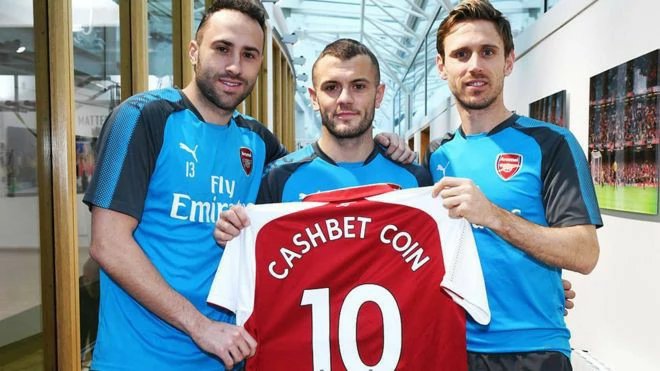
From numbers on shirts to goal-line technology, the football industry has never been slow to adapt to new ideas and technologies.
More recently, Video Assistant Referees (VAR) have emerged, while fan apps bring playing content and commercial products to supporters off the field of play.
Now the sport - if a little tentatively - is starting to dip its boots into the world of crypto-currency and its supporting blockchain technology.
Earlier this year English Premier League club Arsenal became the first major football club to sign a deal to promote a crypto-currency. It reached an agreement with the gaming company CashBet to advertise its CashBet Coin - used for gambling - at Arsenal's home league games.
Crypto-currencies are a medium of financial exchange, a form of digital cash. There are reckoned to be about 1,500 of them in existence.

Even Argentine star Lionel Messi has got involved in this new world, claiming in a promotional post on behalf of one company that he had been "digging deeper into blockchain and decentralised systems".
- Lionel Messi scores trademark victory
But despite such high-profile endorsement, football has yet to explore this new world fully, with most clubs, federations, and industry experts adopting a wait-and-see attitude.
'Great opportunity'
Blockchain, which underpins the crypto-currency Bitcoin, is a secure method of recording data - a digital ledger of transactions, agreements, contracts - anything that needs to be independently recorded and verified as having happened.
- Meet the woman on a mission to teach us about blockchain
- What is blockchain and how does it work?
- 50 Cent Bitcoin stash now worth $8m
The big difference to traditional ledgers is that this record of transactions isn't stored in one place, it's distributed across several, hundreds or even thousands of computers around the world. This makes it harder to tamper with.
"Sport, including football, has a great opportunity to utilise this new technology and be at the forefront of its future adoption," says football business expert Michael Broughton of advisors Sport Investment Partners.

"It can help provide a better service and generate greater revenues.
"But blockchain technology needs to be presented to people in sport in a way that emphasises their user experience will be the same, but that personal and financial details will be much more secure."
Stadium security
Mr Broughton says there are a number of sports-related spheres where blockchain technology can be used, among them gambling and ticketing.
He says using blockchain technology should mean no-one can fake bets; there will be an unchangeable record of who made the bet, and when it was time-stamped.

"You have a more secure betting system if you know those bets are legitimate, which can only be good for gambling companies and the sports betting industry," he says.
"More bets can be made that are more likely to be legal bets."
But he believes it is with ticketing that there is the most potential for blockchain in sport.
Football marketing
"At present most sports venues do not know exactly who is coming into the stadium," he says. "At Premier League football clubs it is not unknown for people to let friends use their season tickets when they cannot get to games.

"The football clubs may know a ticket was used, but not always by whom. So they will never be able to target any further club marketing towards these spectators. You will have less fan engagement. Most clubs and stadiums have this issue.
"If you put your ticketing system onto the blockchain, you can verify if people attended, or who they gave their tickets to. If people want to transfer these tickets to friends or others then it has to be recorded on the blockchain."
European rules
Mr Broughton says as well as marketing advantages, it could also help tackle touting and increase stadium security.
"Using a ticketing operation that is built on blockchain you will not become 100% secure but it won't be far off," he says.
One thing to consider when looking at uses of blockchain in sport is the introduction of the European Union's General Data Protection Regulation (GDPR) this month.

It means that organisations need to keep records of all personal data, be able to prove that consent was given, show where the data's going, what it's being used for, and how it's being protected.
"I believe that GDPR will hasten some uses of blockchain," says Mr Broughton. He said a key component of GDPR was that the consumer should have control over their data.
- Are you ready for a data privacy shake-up?
"If they decide it shouldn't be used any further then that gets placed on their block and shuts down use or visibility of their data. Whilst it's securely stored it can't be used until permission is granted.
"It should help stop companies from re-selling your data onwards, too."
'Cutting costs'
Lawyer Christina Henry, from legal firm Wiggin LLP, has also looked closely at blockchain and sport, and sees potential use for the technology in managing sports rights, and in the field of drug testing.
"Buying and selling sports broadcasting rights is big business," she says.
"Today fans have many more options for accessing content than they used to - which means the rights market has become increasing cut up," she adds, pointing out that traditional TV viewing has been joined by fans viewing clip-form content on their smartphones and live streams over social media.

"There can be complexity in carving up these rights. Blockchain networks have the potential to help sports organisations and broadcasters track the rights that have been licensed and identify those rights left unexploited."
She adds: "Smart contracts on the blockchain network could also help facilitate automatic payments back up through the chain of rights holders when these rights are exploited."
Smart contracts help people exchange money or property in a transparent way which avoids the services of a middleman, potentially saving on costs, and having a solid audit trail.
'Secure records'
Ms Henry also says that blockchain technology could make drug testing regimes in sport more robust.
"There may be potential for blockchain to be used as a kind of secure record management system for logging prescriptions and test results, but in the context of drug test results a private blockchain network - rather than a public network - would be more appropriate," she says.

She said the whole purpose would be to bring different entities, such as governing bodies and testers together in a system which would be very difficult to tamper with.
The interested parties would all have to agree robust rules on the process for validating data upon input, since, once on the blockchain, it couldn't be altered.
Ms Henry says it might still be some time before blockchain is regularly used in sport.
"Having said that, it is something that is moving fast," she adds. "But clubs have to work out why they are doing something, and whether using blockchain make things better or not?"











